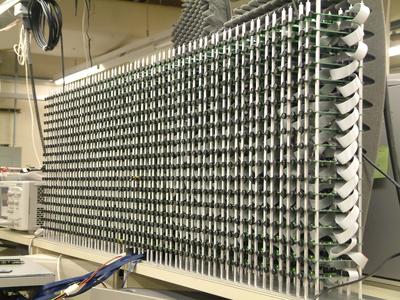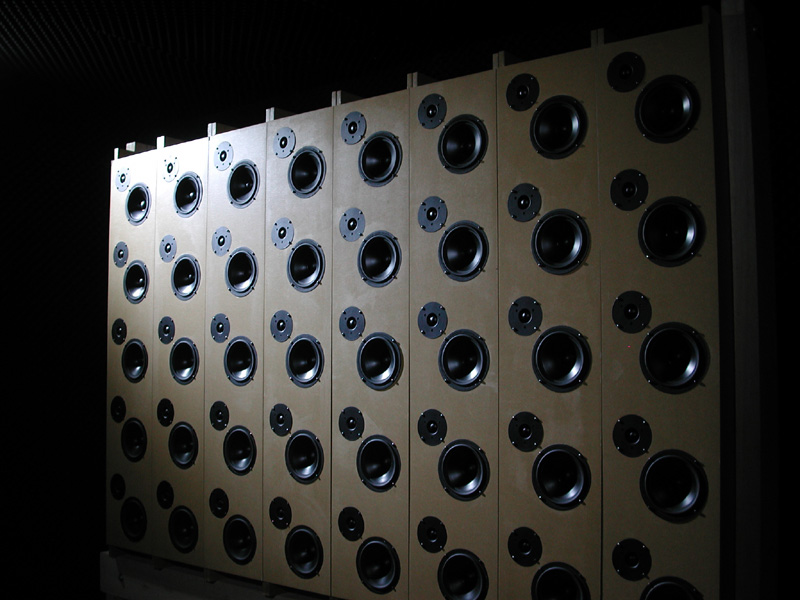Page 1 of 2
So who wants to make one of these?
Posted: Tue Oct 12, 2010 11:14 am
by jason
Re: So who wants to make one of these?
Posted: Tue Oct 12, 2010 12:13 pm
by lilltroll
"Did you notice the bubble-gum? " :)
PS. The wave-length used in 3G & 4G has about the same wavelength as a human speech in air (at least in the same decade), so it's also nice to use for electromagnetic wave's to achieve nice SNR from the base-station to the cell-phone. DS
Re: So who wants to make one of these?
Posted: Tue Oct 12, 2010 1:17 pm
by williamk
Whoooo, that's just too cool. :ugeek:
Wk
Re: So who wants to make one of these?
Posted: Tue Oct 12, 2010 4:21 pm
by bsmithyman
It's probably something you could do on XMOS. I don't know about 300+ mics, might need multiple G4s for that. It would depend on the analogue stage and how it was set up... It would probably need very high bitrate sampling to do the time shifting of the traces effectively, but the issue is also one of managing that many I/O lines. The precision of the design of the array itself and the microphone elements must be pretty impressive.
Re: So who wants to make one of these?
Posted: Tue Oct 12, 2010 9:23 pm
by lilltroll
You do not need a hi sampling-rate, you can shift the signal by any degree since it's bandlimited. Things do not end up in just addition and a time-shift, it ends up in FIR filters which describes the propagation path.
E.g. shifting can be done by the convolution by the actual signal and a sinc.
See
http://en.wikipedia.org/wiki/Sampling_theorem
Re: So who wants to make one of these?
Posted: Wed Oct 13, 2010 2:22 am
by bsmithyman
lilltroll wrote:You do not need a hi sampling-rate, you can shift the signal by any degree since it's bandlimited. Things do not end up in just addition and a time-shift, it ends up in FIR filters which describes the propagation path.
E.g. shifting can be done by the convolution by the actual signal and a sinc.
See
http://en.wikipedia.org/wiki/Sampling_theorem
Good point, I was thinking in terms of whole-sample shifts to reduce the filtering required. Even then you'd need to do post-processing, so there's filtering required regardless.
Re: So who wants to make one of these?
Posted: Wed Oct 13, 2010 7:01 am
by lilltroll
I do not have any special knowledge about this special device, but in general there is several reasons to use FIR-filters/FFT filtering. The market-department usually talk about "subtraction and delays" independent of the technical solution ;)


From
http://www.nt.tuwien.ac.at/fileadmin/us ... linger.pdf
Some even heavier device

And you can of course do it the other way around; as a transmitter

This one, seems to use 128 loudspeakers to create Wave-Field Synthesis

Re: So who wants to make one of these?
Posted: Wed Oct 13, 2010 8:30 pm
by otitov
lilltroll wrote:...
PS. The wave-length used in 3G & 4G has about the same wavelength as a human speech in air (at least in the same decade), so it's also nice to use for electromagnetic wave's to achieve nice SNR from the base-station to the cell-phone. DS
Lilltroll, please take a look at "phased arrays"
http://en.wikipedia.org/wiki/Phased_array, they have about 100 years.
I am quite surprised that phased array principles were applied to sound propagation just now (may be I am just not aware of earlier works in sound phased arrays).
Re: So who wants to make one of these?
Posted: Wed Oct 13, 2010 9:07 pm
by leon_heller
Beamforming is a related technique, it's often used in sonars. I got a lot of electret microphones to try the technique out, I was intending to mount them in holes in a strip of wood.
Re: So who wants to make one of these?
Posted: Thu Oct 14, 2010 12:05 am
by bsmithyman
leon_heller wrote:Beamforming is a related technique, it's often used in sonars. I got a lot of electret microphones to try the technique out, I was intending to mount them in holes in a strip of wood.
It's also used in many/most medical ultrasound systems, either physical beam forming or shifting of the digital signals.




